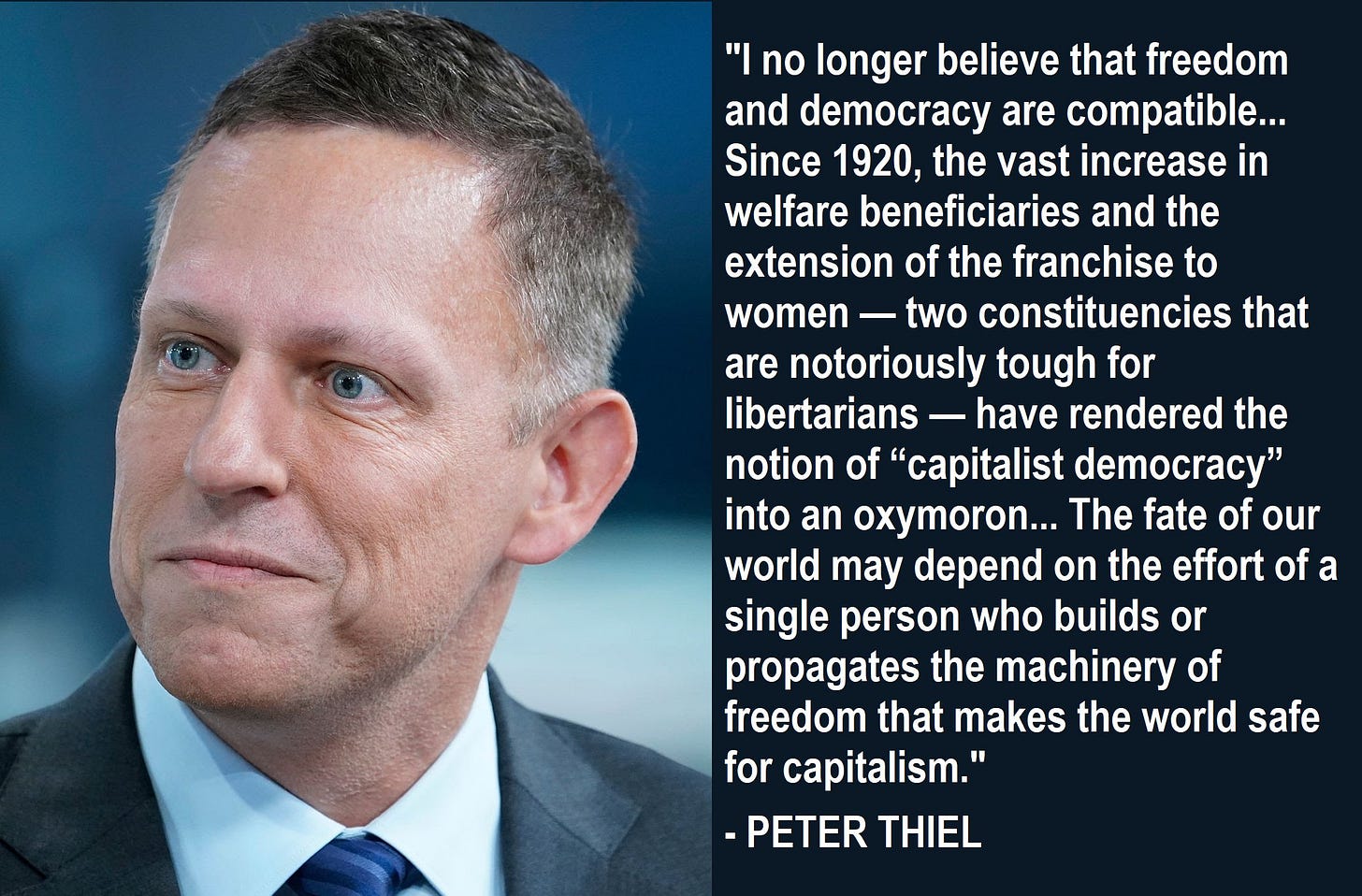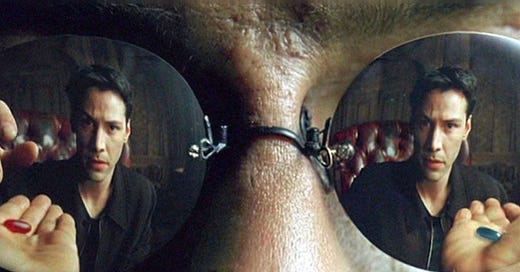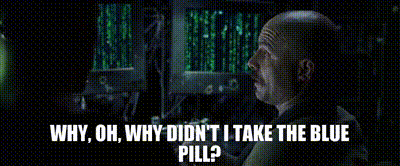No Future: How the Post-Liberal Right Mistakes Cynicism for Awakening
Why NeoReactionaries Are Red-Pilled, but Still Asleep—Just in a Darker Dream
Hey, Slick!
The year is 1985. Careless Whisper is playing on the radio; you’ve just taped it off the air onto a Maxell cassette. Your Walkman clicks shut. Your brand-new Reeboks still squeak on the linoleum. Reagan’s on TV, between episodes of Family Ties and The Day After.
The Cold War is cooling. The malls are full. The future looks like neon, microwaves, and maybe a space shuttle. Life is good.
But under the soft glow of the screen, something is curdling. Collapse is brewing.
You’d know if you picked up that book at the bookstore with a funny title, Neil Postman’s Amusing Ourselves to Death. But it was either that, or a Batman comic…
I. Amusing Ourselves to Death and the Collapse of Orientation
“What Orwell feared were those who would ban books.
What Huxley feared was that there would be no reason to ban a book, for there would be no one who wanted to read one.Orwell feared those who would deprive us of information.
Huxley feared those who would give us so much that we would be reduced to passivity and egoism.Orwell feared that the truth would be concealed from us.
Huxley feared the truth would be drowned in a sea of irrelevance. [...]This book is about the possibility that Huxley, not Orwell, was right.”
—Neil Postman, Amusing Ourselves to Death
Orwell feared a boot stamping on a human face; Huxley feared no one would care.
Postman sided with Huxley, and he was right: the decay came not through fear, but trivia; not through oppression, but sedation and the pleasure principle. And that might have been Huxley’s early elitism; yet Carl Sagan, who was no elitist, expressed similar concerns1.
But what if the story doesn’t end with sedation, Slick? What if the deeper trap comes after you see through it—when disillusionment turns into dogma, and clarity becomes a mask?
Thirty or forty years later, we might add a twist. 1984, Fahrenheit 451, Animal Farm, and a dozen other old warnings are making a comeback: surveillance, censorship, cultural purges, updated for the algorithm age.
The scaffolding of collapse, though, was Huxleyan—sedation came first. But the greater damage was done to the soul. Beneath the trivia came something deeper: a collapse of orientation. The modern world is unraveling—ecologically, socially, economically. Yet it is not just the institutions that are failing, but our capacity to mature.
We were promised ascent: that knowledge would guide us, progress would lift us, and meaning would anoint us at the summit. That society, while imperfect, would be anchored by shared values. Instead, we live in an age of flickering screens, ambient dread, and the vague sense that something sacred has gone missing.
Thinkers, from Herbert Marcuse to Mark Fisher, Guy Debord to Byung-Chul Han, have all diagnosed this in different ways. What emerges is a common thread: infantilization. Our world promises freedom but delivers sedation. Comfort becomes control; depth is replaced by optimization.
And in response, a new movement has risen—one that claims to see through the lie. From stoic masculinity to bronze age virility, from startup monarchies to mythic memes, the Dark Enlightenment promises an alternative.
But what if this "awakening" is just a darker dream?
II. Straussian in the Streets, Red-Pilled in the Sheets
The red pill began as a metaphor for awakening in The Matrix: choosing a harsh truth over a comfortable lie.
But this mythos metastasized in ways the Wachowski sisters never anticipated. The red pill spread through Pick-Up Artist communities, incel forums, and the broader manosphere and alt-right. It became a gospel of despair: women are hypergamous, love is a lie, status is fate.
Quite a bleak picture... And yet, at first, it feels like liberation. You’ve cracked the code; you understand how the world really works. Love is a rigged game, but at least you now understand the rules. Don’t be a nice guy, be a winner: hard, dominant, real. The red pill offered disillusionment as empowerment: the world is broken, but you can still win—if you’re willing to play without illusions.
It was only a matter of time before the metaphor moved from sex to sovereignty.
In neoreactionary (NRx) circles, the red pill became political: democracy is a sham. The masses are cattle. Freedom and equality are lies. And only a technocratic elite should rule. Just as incels rejected the myth of romantic love, NRx thinkers rejected the myth of liberal democracy. They share more than a metaphor: they share a psychological trajectory of disillusionment.
Maybe because these are the same people, Slick…
Both begin from the same premise: modernity lied to you. The only difference is which hierarchy they fixate on: the sexual marketplace, or the power marketplace.
Long before the red pill metaphor, Leo Strauss dignified the logic, gave it gravitas. The truth, he argued, was not just too complex for the many; it was corrosive.
Not all men are created equal. Democracy flatters, but it does not elevate. Without noble illusions, society risks collapse.
So the truth must be veiled, preserved in silence, wielded by the elite few for the sake of the whole. A society cannot survive on truth alone—not because it prefers lies, but because truth, untempered, would burn through the roots of the sacred, the shared, the stable.
The red pill is this temptation made aesthetic: a taste of forbidden clarity, marketed as maturity.
What unites incels, reactionaries, and Straussian political theorists is this belief in exclusive initiation—you’ve seen through the veil, passed the threshold, descended into the abyss. But instead of arriving at freedom, you inherit a heavier burden: cynicism as enlightenment.
The initial rush of forbidden insight tends to mutate into something colder still: the black pill. The system is not just broken, but unfixable. You’re not just lied to: you’re doomed.
A fatalism born in incel culture, mirrored soon after in reactionary politics: collapse is inevitable. Strauss feared unfiltered truth not because it wasn’t real, but because it was dangerous; too volatile to be shared widely. It could unravel society and civilization. But where Strauss cautioned, NRx capitalized. They took this corrosive insight and made it their brand. They didn’t protect the noble lie; they exposed it, aestheticized it, weaponized it, shouted it from the rooftops.
And to them, it’s not just dangerous or edgy; it’s heroic.
Fukuyama mourned the end of history: the fading of grand ideological struggles, the twilight of heroism. A secular lament for a world where comfort replaced conviction. But the New Right doesn’t mourn it: it spits on the grave.
For them, the liberal order isn’t a fulfilled dream but a sedative nightmare. They don’t want to sustain it, but to transcend it. To light a new fire. That’s the paradox: in contrast to a system that promises comfort at the cost of conviction, even authoritarian myth feels like ascent.
And so, cynicism becomes courage. The red pill becomes a rite of passage. And the end of history becomes a call to conquest. This is where the New Right operates—not from ignorance, but from a stylized knowledge of despair.
And the discipline it calls for must be seen in this context. If you’ve swallowed either pill, red or black, and accepted that the world is cruel, discipline is what remains. Not to heal, but to harden.
Love is all about status, politics are all about domination, so all you have left is control—of the self, of appearances, of others. All that’s left is posture. When orientation fails, control becomes a substitute for meaning.
And so, the call to heroism becomes a regimen. The rite becomes routine. The soul becomes aesthetic.
III. The Discipline Fetish: When Strength Replaces Soul
To their credit, many on the New Right recognize and answer something real: modernity has left us adrift. Grown men amusing themselves to death—lost in algorithmic playpens, addicted to Candy Crush and OnlyFans, binge-watching prestige television that pretends to be profound (or not even).
This critique comes from many corners, but the version we’re focused on here belongs to a particular current—what has come to be called the New Right, and more precisely, the NRx-adjacent, post-liberal elite subculture that blends red-pill fatalism with trad aesthetics and techno-masculinist ethos. These are the theorists and stylized dissidents who reject softness not just as weakness, but as decadence—and who treat cynicism as a form of intellectual clarity.
Rituals of maturity have collapsed. The ascent to adulthood has been replaced by a feedback loop of distraction and self-soothing. Infantilization isn’t just cultural, it’s civilizational: the ascent of man has stalled, maybe even begun to reverse.
They sense that the world has grown soft, flaccid, unformed: lives optimized for safety, not meaning. College majors chosen for employability, not wonder. Careers planned like retirement strategies. Moral ambition traded for brand management. Even rebellion comes prepackaged as aesthetic.
And so, many on the New Right want to resurrect discipline. They want to grow up, to grow strong, to reclaim a sense of order and virtue. They want to become men again.
They reject softness, liberal sentimentality, and democratic decay; instead, they offer hierarchy as an antidote to entropy. They embrace mythic sovereignty, either in the order of christianity without grace—rules without mercy—or the ancient appeal of paganism, and virile transcendence.
They build rituals of selfhood in hyper-curated fitness regimens and self-optimization spreadsheets. They embrace martial aesthetics, if not martial arts. They share ancient philosophy quotes and esoteric memes on Instagram, maybe even join a book club.
But beneath the call to strength lies a deeper fear: of vulnerability, of relation, of true descent. What they resurrect is not the crucible of becoming, but its performance: not death and rebirth, but perpetual self-audition. Not descent into soul, but domination over weakness.
Instead of playing Candy Crush, there’s lifting iron and the cult of the perfect physique. Instead of OnlyFans, discipline porn. Instead of Netflix, podcast maximalism and pseudo-mystical trad aesthetics.
Call it a vibe shift, Slick, or a culture war in a different uniform.
What it isn’t, though, is transformation. It’s transcendence as theatre, a more difficult distraction dressed in myth. A new soma—darker, leaner, more impressive, but just as hollow.
The post-liberal right diagnoses infantilization correctly, but responds with externalized, performative solutions: stoicism as a brand, classical education as prestige, masculine virtue as style, esotericism as gatekeeping.
Whatever happened to Fight Club…
But this isn’t just a lifestyle, it’s a worldview. They wield cynicism as truth, and truth as strength.
They don’t just quote the canon: they weaponize it. They half-read Nietzsche and call him their prophet. They misread Girard and call it realism. They adopt Strauss, Evola, and Schmitt like talismans, not to be transformed by the encounter but to affirm what they already believe: that the world is cruel, power is sacred, and the strong should rule.
They speak of forbidden knowledge, but what they hold is a closed circuit. Their ideas don’t mature, they harden; their insight doesn’t expand, it sharpens. They see opposition not as critique, but as proof they’re right. And from this logic—where persecution equals truth and power is the only measure—they build a self.
A self not formed in relation, but in reaction; not to grow, but to guard the wound. And one that feeds the ego, not the soul.
And the truth is, they were never after transformation. They want control.
They call it discipline, but it’s often just self-harm that flatters the ego. They invoke the sacred—but treat it like a weapon. Myth without mystery, power without grace. They do not enter the temple to be changed; they build thrones where altars should be.
They preach tradition, but without the moral weight. No awe before virtue, no wrestle with conscience, no hunger for the good. What they revere is not the sacred, but the styled. Their altars are empty—just mirrors in gold leaf.
They fear surrender, yet call it weakness. But what if grace—not domination—is the real test of strength? What if poetry, not posture, is what endures?
They fear surrender more than failure. Real discipline requires not just effort, but exposure: to grief, to love, to the unknown. But their version is all grit, no grace. It looks like strength—but it’s just armoured despair.
IV. Mistaking Darkness for Depth: How Cynicism Becomes Dogma
Their Enlightenment is Dark, not because they descend too deep, but because they stop too soon.
They confront the lie, but replace it with a frozen truth, a dead truth that can’t grow, can’t heal, can’t relate. They destroy myth but offer no mystery. They reject the noble lie, but replace it with an ignoble ‘truth’: power is all, love is fake, hierarchy is destiny.
What they call realism is often just an unhealed wound. What they call strength is often the refusal to feel. It is trauma dressed as clarity, cynicism mistaken for depth; and in doing so, they create a mirror that confirms their worst fears. They stare into the void—and see themselves, unchanged.
Because they’ve left nothing else there.
Those who see only masks become masked themselves…
Even Nietzsche, who proclaimed God’s death and unmasked comfort as cowardice, did not stop at disillusionment. He didn’t merely see through illusions—he sought to replace them with living fire.
‘Become who you are’ was a demand, not a dismissal. He sought creation, not collapse; not the rule of the strong, but the birth of the self through fire. He did not whisper ‘obey nature’—he roared ‘give birth to a dancing star.’ The Übermensch was never a trad bodybuilder edgelord with a podcast, but a reweaver of value.
The world they denounce—the cold, selfish, disenchanted world—is the one they help create. When you offer only cynicism, you invite only masks. When you scorn vulnerability, you train others to hide. What you see in the world is shaped by what you dare bring to it.
The red pill promises reality; but what it delivers is a hall of mirrors, where every reflection flatters your pain.
They believe they are escaping the herd, but they are just mimicking it with better branding.
They believe they are awake, but they are only reacting.
These ideologies feel deep because they touch taboo topics (sex, race, power, collapse…) and speak with the certainty of forbidden knowledge. But gravity isn’t depth; you’re not expanding, you’re being pulled in.
And as you’re pulled in, the world bends around you. Cynicism isn’t just contagious, it’s creative: it makes the world in its image.
Here’s how that pattern plays out.
The Descent: From Alienation to Authority
It starts with a sense of rejection—social, sexual, or civilizational. A man feels overlooked; a mind feels betrayed. What begins as pain quickly seeks an explanation.
Then comes the red pill: a seductive narrative that promises to decode it all. The “truth” is framed as forbidden. Women are biologically wired to disdain you. Democracy is a scam. Society is built on lies.
Reject this insight, and you’re just another NPC; accept it, and you’re finally awake.
But this isn’t awakening, it’s rationalized resentment. The red pill reframes suffering as proof that the system is rigged. Personal responsibility is discarded in favor of systemic blame: you’re not flawed, the world is.
Once this foundation is laid, anything that flatters the wound can be accepted.
Evolutionary psychology becomes a crutch: it says women reject you because they’re programmed to.
Race and IQ pseudoscience tells you democracy fails because inferior minds are allowed to vote.
Eugenics follows easily: if inferiority is natural, why not engineer society around it?

They go from “this is unfair” to “this is just how nature works.”
Soon enough, despair calcifies into identity. The black pill arrives: there’s no fixing the world. Incels become convinced love is a lie. NRx believers decide liberalism is unsalvageable. Collapse becomes inevitable—so why not accelerate it?
For both incels and neoreactionaries, the original disillusionment is personal. And beneath the surface, the structure is the same: a sense of betrayal, of promises broken, of systems rigged. What begins as sexual despair or social humiliation soon becomes metaphysical. They don’t just believe the world has failed them—they believe it was designed to fail: by nature, by democracy, by women, by the weak. What starts in the bedroom ends in the voting booth, and then in dreams of empire.
And then comes the final twist. The call for agency mutates into a longing for authority. Not in themselves, but above them: a king, a dictator, an algorithm. Someone who will enforce the “right” rules—rules that just so happen to reward their status, intelligence, or pain.
They began by seeking truth. They ended by surrendering agency, so long as it flattered their pain.
The Ultimate Irony: the Bitter Mirror
They believe they’ve discovered the hard truths no one else can handle. But what they call clarity is often just revenge in disguise: truth sharpened into a weapon. Insight, not to understand but to punish.
They aestheticize collapse, romanticize hierarchy, and rebrand their bitterness as realism. Even despair gets a makeover: Roman busts, Gothic fonts, Byzantine icons. The tragedy is not that they suffer, but that they mistake their suffering for wisdom—and build a whole world to justify it.
What they call realism is just self-fulfilling prophecy. What they see isn’t the world—it’s their wound, reflected back. They create the very dynamics they claim to merely diagnose: love becomes a contest, democracy becomes a scam, and they call it clarity.
Red pill men believe women are status-driven, so they perform status and neglect soul—thus attracting only transactional dynamics. Elites assume masses are manipulable or fragile, so they manipulate—thus infantilizing or disorienting the masses. Political movements obsess over enemy tactics, so they mirror them—thus becoming what they once opposed (free speech, anyone?)
They claim to reveal reality—but forget that perception is not passive. The world bends to our posture; when you approach it with suspicion, you summon reasons to be suspicious. Like a game of Prisoner’s Dilemma where everyone defects and calls it wisdom, their cynicism doesn’t just describe a broken world—it ensures it stays broken.
But there’s a difference between seeing darkness, and becoming it. What they’ve really done is trade one matrix for another. Instead of the mainstream narrative, they buy into a reactionary one that absolves them of responsibility.
Instead of thinking for themselves, they adopt any belief that justifies their bitterness.
Instead of escaping manipulation, they’ve just picked a manipulator who flatters them.
They don’t escape control. They just aestheticize it. Their language isn’t a ladder to truth; it’s a fortress to hide their wound. Their vocabulary sounds like prophecy, but it’s just armour for a wound they won’t name—a way to stay angry instead of grieving, to dominate instead of risking love. Just pain avoidance, dressed in myth and apocalyptic tones.
They pursue the sacred, yet resist its transformative power. They mistake the Grail2 for a crown, mystery for control. They want initiation without death. Power without surrender. Truth without love.
They posture as rulers in exile, prophets in the wilderness—but they dine with kings and code with billionaires. The joke stopped being funny once it got funding (actually, it never was).
They claim to reveal reality—but forget: truth isn’t a static object. It’s a dance. We shape it by how we move toward it.
They thought they saw through the lie. But they mistook depth for darkness. And in stopping there, they never really descended at all.
V. Epilogue. The Mirror’s Edge, and the Real Red Pill
You don’t break this spell by shouting it down. You break it by becoming someone who no longer needs an enemy to feel real.
Not by unmasking others, but by becoming someone who no longer fears being seen.
They think power protects, but it’s vulnerability that transforms. They worship control. But healing doesn’t come from power. It comes from surrender. From vulnerability. From love.
Their realism is just despair, dimmed for ambiance. The real red pill isn’t knowing how broken the world is; it’s refusing to let that knowledge make you small.
The real red pill is not domination, but healing. Not power over, but care within. The Grail was never a prize for the strong; it was a question for the wounded. It didn’t appear to the most righteous or powerful, but to the one who asked what ails thee?
They call for apocalypse3. But what the world needs is atonement.
You can spend your days spiralling through forums, chasing proof that love is a lie and democracy is doomed. Or you can step outside the frame—and build something better.
You want love, power, purpose?
Do something interesting.
Build something that matters.
Offer something before demanding it.
Be valuable—not because it’s owed to you, but because you dared to give.
Maybe even be kind, not as a tactic—as a way of life.
You wanted to awaken?
Then open your eyes. Love—not hierarchy—is what truly transforms.
You wanted truth?
Here it is: Kindness is harder. That’s why it’s rarer. That’s why it’s real.
Now Slick, if you could share this with three to five people who need to hear this (for comic relief or an existential crisis), that’d be really kind…
“I have a foreboding of an America in my children’s or grandchildren’s time—when the United States is a service and information economy; when nearly all the key manufacturing industries have slipped away to other countries; when awesome technological powers are in the hands of a very few, and no one representing the public interest can even grasp the issues; when the people have lost the ability to set their own agendas or knowledgeably question those in authority; when, clutching our crystals and nervously consulting our horoscopes, our critical faculties in decline, unable to distinguish between what feels good and what’s true, we slide, almost without noticing, back into superstition and darkness.
The dumbing down of America is most evident in the slow decay of substantive content in the enormously influential media—the 30-second sound bites (now down to 10 seconds or less), lowest common denominator programming, credulous presentations on pseudoscience and superstition—but especially a kind of celebration of ignorance.”
—Carl Sagan, The Demon-Haunted World (1995)
We gotta talk more about the Grail, Slick…
Sorry, apokalypsis: I, too, wanna sound cool and cultured.









A bit repetitive, but you are doing the work, Slick; you are thrashing this out. Congratulations. And thank you.
I agree with one of the comments that feminism is a pretty easy response to throw at this episteme. But also Walter Benjamin, Foucault, a correct reading of Gramsci... And then my shtick, speaking of hermeneutics: liberation theology. That gets all your symbolism and mythology, but sets it right. Makes sure the Christian Nationalism gets tapped down as well. Throw in some blues — both written and sung, Jimmy Baldwin and Blind Blake — and you’ve got a humdinger.
Amazing post. The thought process to produce this must have been intense.